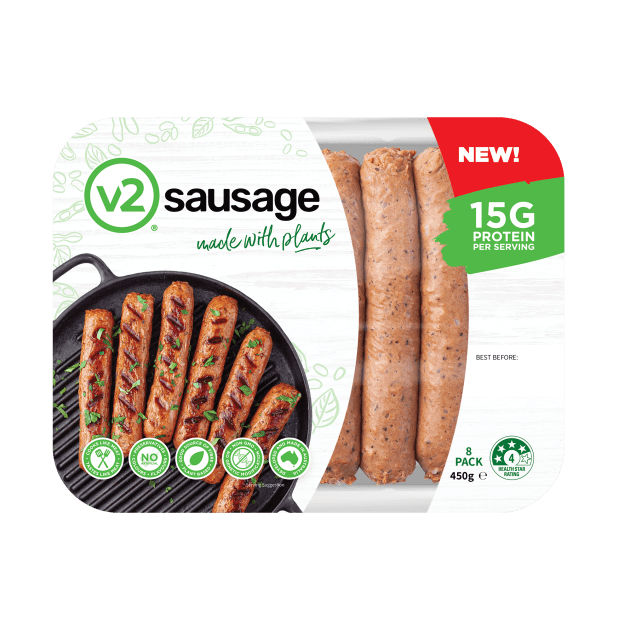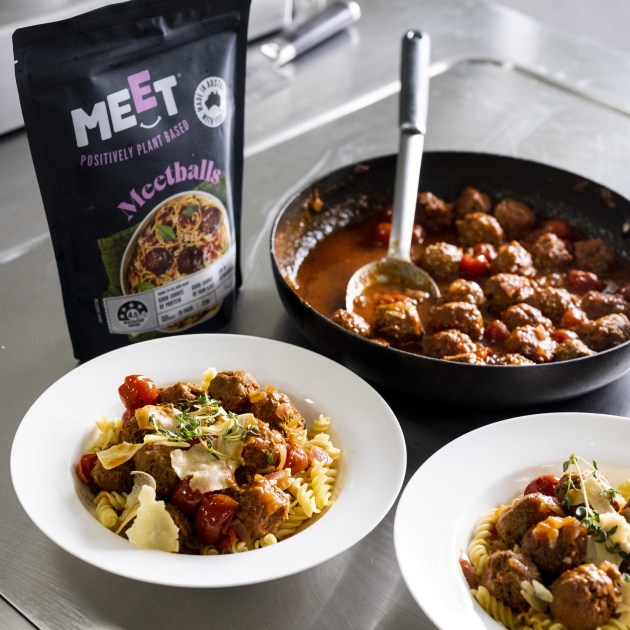The sale of plant-based meat increased by 46 per cent in Australia in the last financial year, but the economic opportunities of the local plant-based market remain largely untapped. Kim Berry takes a look at the state of the industry. This article was first published in Food & Drink Business April 2021.
The 2020 State of the Industry report from alternative protein think tank Food Frontier found that from FY19 to FY20, the Australian plant-based meat sector doubled its manufacturing revenue, workforce, and number of products on retail shelves.
Food Frontier CEO Thomas King tells Food & Drink Business in headline terms the data correlates to that of one third of Australians trying to limit their meat consumption.
“Those consumers and flexitarians want the familiarity and convenience of a burger for the barbecue or mince for the Bolognese, while others still favour more traditional plant-based options like tofu for the stir-fry or lentils for the burger.”
At the Food Agility Summit in March, Woolworths Group chair Gordon Cairns said the retailer saw a 60 per cent increase in plant-based protein sales in 2020.
This growth is reflected in the Australian plant-based meat sector’s manufacturing revenue, which nearly doubled from $35.2 million in FY19 to $69.9million in FY20.
Employment increased 106per cent from 265 to 547 people. That is 246 direct full-time equivalent (FTE) roles (up 137per cent) and 301 extra indirect FTEs, an increase of 87per cent, which relates to the sector’s purchase of up-stream inputs.
Average wages in the sector fell from $94,000 to $73,000, reflecting the employment of more production workers as output increases.
With such rapid growth, King says governments need to support investment in R&D and infrastructure for the industry, as well as evidence-based regulation to ensure an even playing field for new players.
Fifteen years ago, ProForm Foods founder Stephen Dunn saw what is now obvious to all – the issue of feeding a global population with finite resources and space. A pioneer in the Australian plant-based industry, Dunn initially worked with CSIRO on developing technology to produce plant-based meat on a commercial scale.
His son and now CEO of ProForm Matt Dunn tells Food & Drink Business while his father was talking about global food supply in 2005, “it was only about four years ago we started to see the groundswell for plant-based foods in Australia take off”.
The drivers
Food Frontier head of industry engagement Karen Job tells Food & Drink Business there are numerous reasons for plant-based growth, including consumer motivation.
“A primary motivator is health, but also ethics around caring for the environment and animal welfare. But there is a bigger, more over-arching need for this,” Job said.
In 2019, EAT-Lancet Commission reported on the findings of 37 scientists who had spent three years analysing the best available data to form a global ‘planetary health’ diet. They took into account environmental sustainability, human health and food security.
Its findings recommended a 50 per cent global reduction in meat by 2050 and more than doubling the consumption of protein from pulses and grains.
“There is plenty of research from experts as well as the Lancet study that have shown there will simply be not enough animal protein to feed the population in 30 years’ time.
“It’s the need for plant-based protein that means this isn’t a fad, it is not a trend, it is so much more than that. This is an absolute necessity for feeding humanity on the planet and I don’t say that lightly,” Job says.

Pure Foods Tasmania has acquired two plant-based protein businesses in the last 12 months. CEO Michael Cooper tells Food & Drink Business the company’s goal is to earning more than $100 million revenue in five years by offering a range of premium Tasmanian food and beverage products.
“I’m very consumer driven, so we looked at the trends and identified where we needed to be. The plant-based food category is the fastest growing in the world, and super exciting because no two products are being produced to the same recipe. Growth for plant-based cheeses is currently in the plus-20s, it’s gone ballistic.
“Younger generations are focused on making the world a better place. Our focus is on encouraging people to adopt a flexitarian diet.”
Cooper’s comments echo those of Unilever Foods & Refreshment Division president Hanneke Faber. In late 2020, the global company announced its Future Foods Initiative. At its core is a $1.63 billion sales target for plant-based meat and dairy alternatives within the next five to seven years.
Faber said: “It’s not up to us to decide for people what they want to eat, but it is up to us to make healthier and plant-based options accessible to all. These are bold, stretching targets which demonstrate our commitment to be a force for good.”
Job says the health motivators are one of reasons plant-based meats are increasing in popularity is the format they’re available in.
“Plant-based meat offers consumers a really convenient alternative to help their animal meat reduction journey. The familiar formats of burgers, mince, and schnitzel help them try plant products in a non-threatening way,” she says.
Demand grows for Australian made
Cooper says part of Pure Foods Tasmania’s success is its positioning as a premium Tasmanian product.
He says, “We have rocketed a lot quicker than many expected we would. It was all about timing. We were going to market to raise capital before listing in March. COVID-19 had just gone berserk and we’re in Sydney with a 12-page presentation. The best I ever got to was page six. Generally, by page two, brokers and investors were saying, how much do you want. We were only going to raise $4 million, and we raised $8 million in four and a half hours – we had to give $4million back.
“It was about the provenance, food safety and the traceability of our food.”
King says, “Australia can build a multi-billion-dollar plant-based meat industry, enabling our food businesses and farmers to capitalise on fast-growing global demand for alternative proteins.
“Australia has the agricultural capacity, commercial appetite and research know-how to become an international leader in new protein industries including plant-based meat.

“To not make the early investments necessary to leverage these unique strengths would be a missed opportunity.”
There is significant demand for Australian grown plant protein ingredients and processing.
From FY19 to FY20, the volume of plant-based meat manufactured in Australia increased 70 per cent, with companies indicating their desire to use more Australian ingredients in their products.
Job says one of the biggest challenges is accessing domestic ingredients. “Of all the companies I work with, north of ninety per cent want to buy domestically grown ingredients. So demand for grains that are grown here and then processed into the isolates and concentrates needed to make the products is already there.”
The scaling challenge
Job says the value to the Australian farming sector of value-adding crops like pulses and legumes as ingredients for products like plant-based meat – instead of farmers selling their crops into volatile commodity markets – is becoming more widely recognised. However, significant investment in local plant protein processing infrastructure is required to cater to this demand.
As it stands, there is only one commercial operation processing Australian crops in Australia, Australian Plant Protein, which came online in September 2020.
Job says the EAT Group’s investment in establishing a protein fractionation facility in Victoria last year brought new, yet limited capacity to Australia.
“There remains significant scope for greater investment in fractionation infrastructure considering the plant-based meat industry, as per Deloitte’s moderate growth scenario, is projected to produce 169,000 tonnes of end product by 2030,” she says.
The demand for plant protein ingredients is expanding into different market segments as well, with demand for baked goods, snacks and sports nutrition products also growing. This demonstrates significant need for local plant protein processing and opportunities for famers to value-add to their crops by selling isolates into Asian markets.
King says at least one state government is actively scoping the need for further investments in such processing facilities to generate jobs and support Australian agriculture, while more private businesses are also exploring the opportunity, signalling key developments ahead in 2021 and beyond.
Increased exports will also be key for the sector to achieve economies of scale, with growth in production volume driving down unit product manufacturing costs.
Greater investment, continuing product innovation and iteration, retail category planning and forecasting that takes into account market maturity, and export are all critical components for the sector becoming a part of every Australian’s diet.
A unified front for new industry
A representative group for Australia’s alternative protein sector was launched in March.
The Alternative Proteins Council (APC) will represent the sector in national policy discussions and ensure a collective voice for the burgeoning industry.
Australian alternative protein think tank Food Frontier’s director of policy and government relations Sam Lawrence says establishing the APC now marks an important step in the sector’s evolution.
Lawrence will be the inaugural secretariat for the body.
He says: “The APC formalises our collaboration to support the 29companies comprising Australia’s alternative proteins sector to engage at a national level on policy issues, enabling the sector’s shared vision and continuing to serve Australians who enjoy alternative protein products.”
Founding companies include Sanitarium, ProForm Foods, v2food, Rogue Foods, Nestlé Australia and Impossible Foods, with additional companies joining soon.
Lawrence says a unified voice was important for the fast-growing sector.








